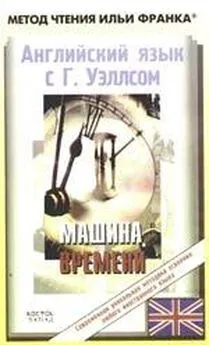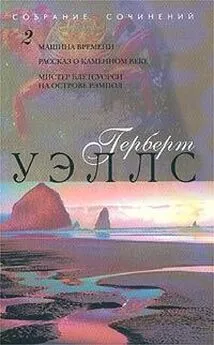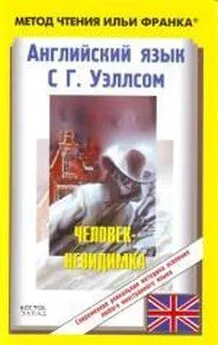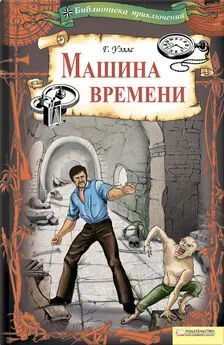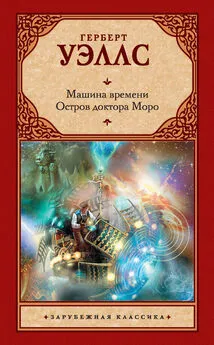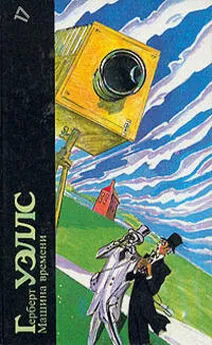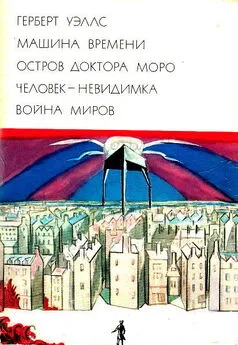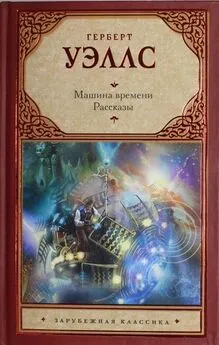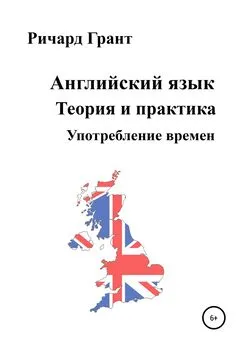H. Wells - Английский язык с Гербертом Уэллсом. Машина Времени
- Название:Английский язык с Гербертом Уэллсом. Машина Времени
- Автор:
- Жанр:
- Издательство:неизвестно
- Год:неизвестен
- ISBN:нет данных
- Рейтинг:
- Избранное:Добавить в избранное
-
Отзывы:
-
Ваша оценка:
H. Wells - Английский язык с Гербертом Уэллсом. Машина Времени краткое содержание
Английский язык с Гербертом Уэллсом. Машина Времени - читать онлайн бесплатно полную версию (весь текст целиком)
Интервал:
Закладка:
Filby contented himself with laughter (Филби довольствовался = ограничился смехом; tocontentwith— довольствоваться /чем-либо/ ).
vague [veIg], inkling [`INklIN], determine [dI`tWmIn], laughter [`lRftq]
'Possibly not,' said the Time Traveller. 'But now you begin to see the object of my investigations into the geometry of Four Dimensions. Long ago I had a vague inkling of a machine—'
'To travel through Time!' exclaimed the Very Young Man.
'That shall travel indifferently in any direction of Space and Time, as the driver determines.'
Filby contented himself with laughter.
'But I have experimental verification (но у меня есть экспериментальное подтверждение),' said the Time Traveller (сказал Путешественник по Времени).
'It would be remarkably convenient for the historian (это было бы в высшей степени удобно для историков; convenient— удобный, подходящий ),' the Psychologist suggested (подсказал Психолог; tosuggest— предлагать, советовать; подсказывать /мысль/ ). 'One might travel back and verify the accepted account of the Battle of Hastings, for instance (можно было бы отправиться назад = в прошлое и проверить общепринятое мнение о битве при Гастингсе [2], например; toverify— проверять; account— счет, расчет; отчет; мнение, оценка )!'
'Don't you think you would attract attention (а вы не думаете, что привлекли бы /слишком большое/ внимание; toattract— привлекать, притягивать )?' said the Medical Man (сказал Доктор). 'Our ancestors had no great tolerance for anachronisms (наши предки не имели = не отличались особой терпимостью к анахронизмам; anachronism— анахронизм, пережиток старины; нарушение хронологической точности; tolerance— терпимость ).'
verification ["verIfI`keIS(q)n], convenient [kqn`vJnIqnt], ancestor [`xnsIstq], anachronism [q`nxkrqnIzm]
'But I have experimental verification,' said the Time Traveller.
'It would be remarkably convenient for the historian,' the Psychologist suggested. 'One might travel back and verify the accepted account of the Battle of Hastings, for instance!'
'Don't you think you would attract attention?' said the Medical Man. 'Our ancestors had no great tolerance for anachronisms.'
'One might get one's Greek from the very lips of Homer and Plato (можно было бы получить = изучить греческий язык прямо из уст Гомера [3]или Платона [4]; lip — губа ),' the Very Young Man thought (подумал = задумчивосказал Очень Молодой Человек).
'In which case they would certainly plough you for the Little-go (в этом случае они бы обязательно пропахали = завалили вас на первом /же/ экзамене; to plough — пахать; little-go — первыйэкзаменнастепеньбакалавравКембридже/разг./ ). The German scholars have improved Greek so much (немецкие ученые изрядно усовершенствовали греческий язык; scholar — ученый /обыкн. гуманитарий/; to improve — улучшать; усовершенствовать ).'
'Then there is the future (тогда в будущее),' said the Very Young Man (сказал Очень Молодой Человек). 'Just think (только подумайте)! One might invest all one's money (можно было бы вложить все свои деньги; to invest — помещать, вкладывать/деньги/ ), leave it to accumulate at interest (под проценты: «оставить их накапливаться под проценты»; to leave — покидать, оставлять; to accumulate — накапливать/ся/ ), and hurry on ahead (и скорее вперед; to hurry — торопить/ся/, спешить )!'
plough [plau], scholar [`skOlq], accumulate [q`kjHmjuleIt], hurry [`hArI]
'One might get one's Greek from the very lips of Homer and Plato,' the Very Young Man thought.
'In which case they would certainly plough you for the Little-go. The German scholars have improved Greek so much.'
'Then there is the future,' said the Very Young Man. 'Just think! One might invest all one's money, leave it to accumulate at interest, and hurry on ahead!'
'To discover a society (а там вы обнаружите общество: «чтобы обнаружить общество»),' said I (сказал я), 'erected on a strictly communistic basis (сооруженное = основанное на строго коммунистических принципах; toerect— сооружать; воздвигать; basis— основа, зд. принцип ).'
'Of all the wild extravagant theories (самая дико экстравагантная теория из всех)!' began the Psychologist (начал /было/ Психолог).
'Yes, so it seemed to me (да, так казалось и мне), and so I never talked of it until (и я никогда не говорил о ней до; toseem— казаться )—'
'Experimental verification (экспериментального подтверждения)!' cried I (воскликнул я; tocry— кричать, вскрикнуть ). 'You are going to verify that (вы собираетесь доказать это )?'
'The experiment (/требуем/ эксперимента)!' cried Filby (закричал Филби), who was getting brain-weary (чей мозг начал утомляться /от рассуждений/; brain— мозг; weary— утомленный, уставший ).
wild [waIld], extravagant [Ik`strxvqgqnt], theory [`TIqrI]
'To discover a society,' said I, 'erected on a strictly communistic basis.'
'Of all the wild extravagant theories!' began the Psychologist.
'Yes, so it seemed to me, and so I never talked of it until—'
'Experimental verification!' cried I. 'You are going to verify that ?'
'The experiment!' cried Filby, who was getting brain-weary.
'Let's see your experiment anyhow (так или иначе давайте посмотрим ваш эксперимент),' said the Psychologist (сказал Психолог), 'though it's all humbug, you know (хотя это все вздор, знаете ли; humbug — обман, притворство; чепуха, вздор ).'
The Time Traveller smiled round at us (Путешественник по Времени, улыбаясь, обвел нас /взглядом/). Then, still smiling faintly, and with his hands deep in his trousers pockets (затем, все еще едва улыбаясь и /засунув/ руки глубоко в карманы брюк; faint— слабый; faintly— слабо, едва ), he walked slowly out of the room (он медленно вышел из комнаты; towalk— ходить, идти ), and we heard his slippers shuffling down the long passage to his laboratory (и мы услышали шарканье его комнатных туфель по длинному коридору, /ведущему/ в лабораторию; tohear— слышать; toshuffle— волочить /ноги/, шаркать; passage— проход, коридор ).
humbug [`hAmbAg], trousers [`trauzqz], shuffle [SAfl], passage [`pxsIG]
'Let's see your experiment anyhow,' said the Psychologist, 'though it's all humbug, you know.'
The Time Traveller smiled round at us. Then, still smiling faintly, and with his hands deep in his trousers pockets, he walked slowly out of the room, and we heard his slippers shuffling down the long passage to his laboratory.
The Psychologist looked at us (Психолог посмотрел на нас). 'I wonder what he's got (интересно, что у него есть; towonder— удивлять/ся/; интересоваться )?'
'Some sleight-of-hand trick or other (какой-нибудь фокус или что-то в этом роде; sleight-of-hand— ловкость рук ),' said the Medical Man (сказал Доктор), and Filby tried to tell us about a conjurer he had seen at Burslem (и Филби попытался рассказать нам о маге, /которого/ он видел в Барслеме; conjurer— вызывающий /духов/, занимающийся магией ); but before he had finished his preface the Time Traveller came back (но прежде, чем он закончил предысторию, Путешественник по Времени вернулся; preface— предисловие; пролог ), and Filby's anecdote collapsed (таким образом, договорить Филби не удалось: «и рассказ Филби рухнул»; anecdote— короткий рассказ; tocollapse— рушиться, обваливаться; терпеть крах ).
wonder [`wAndq], sleight [slaIt], conjurer [`kAnG(q)rq], collapse [kq`lxps]
The Psychologist looked at us. 'I wonder what he's got?'
'Some sleight-of-hand trick or other,' said the Medical Man, and Filby tried to tell us about a conjurer he had seen at Burslem; but before he had finished his preface the Time Traveller came back, and Filby's anecdote collapsed.
The thing the Time Traveller held in his hand was a glittering metallic framework (Путешественник по Времени держал в руке блестящую металлическую коробку: «вещью, /которую/ Путешественник по Времени держал в своей руке, была блестящая металлическая коробка»; framework— остов, корпус; рама; коробка ), scarcely larger than a small clock (/размером/ едва = не больше маленьких настольных часов; scarcely— едва, с трудом ), and very delicately made (и весьма искусно сделанную; delicate— изысканный; искусный ). There was ivory in it (там была = материалом служила слоновая кость), and some transparent crystalline substance (и какое-то прозрачное кристаллическое вещество; transparent— прозрачный; substance— вещество, субстанция ). And now I must be explicit (теперь /рассказ мой/ должен быть подробен: «теперь я должен быть подробен»; explicit— ясный; подробный ), for this that follows (поскольку то, что последовало = произошло потом )—unless his explanation is to be accepted (если не принять его объяснение /как аксиому/; toaccept— принимать; соглашаться )—is an absolutely unaccountable thing (/само по себе/ совершенно необъяснимая вещь = необъяснимо; toaccount— считать, рассматривать; объяснять; unaccountable— необъяснимый, странный ). He took one of the small octagonal tables that were scattered about the room (он взял один из маленьких восьмиугольных столиков, беспорядочно расставленных по комнате; toscatter— разбрасывать ), and set it in front of the fire (и поставил его перед камином; toset— ставить, помещать, устанавливать ), with two legs on the hearthrug (двумя ножками на каминный коврик; hearthrug— коврик перед камином ).
Читать дальшеИнтервал:
Закладка:
